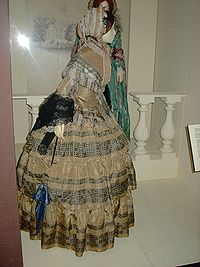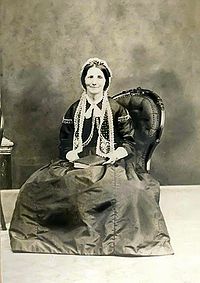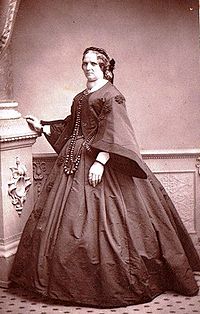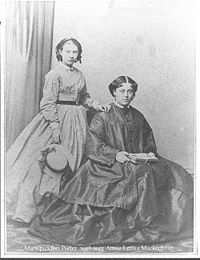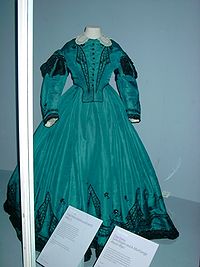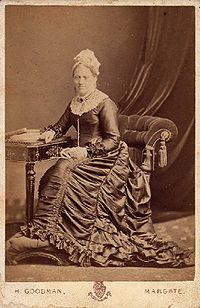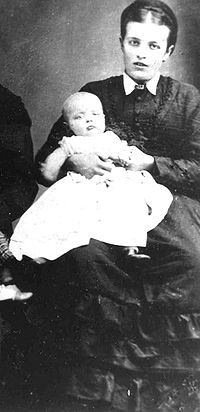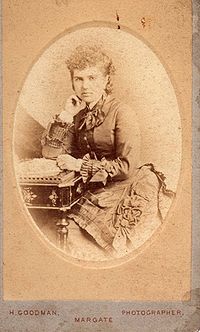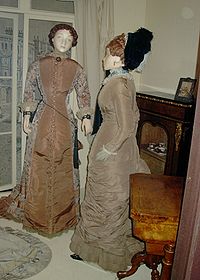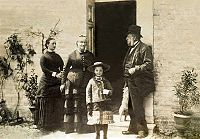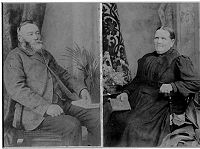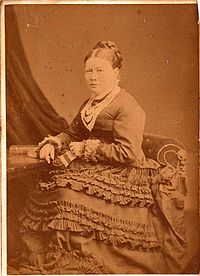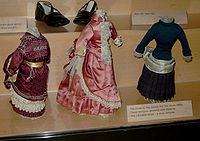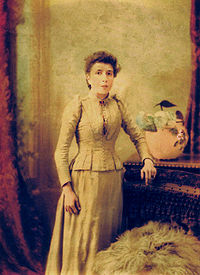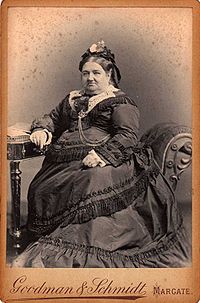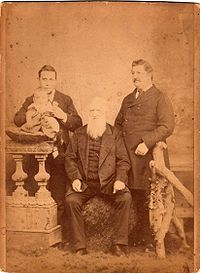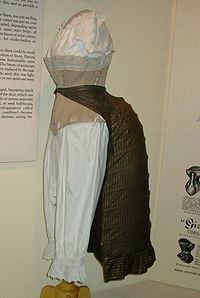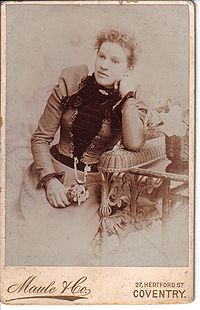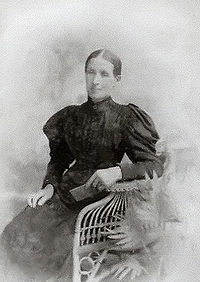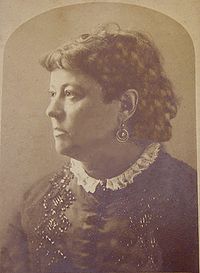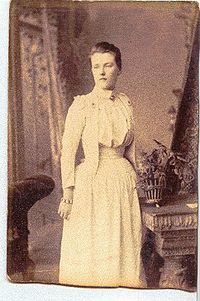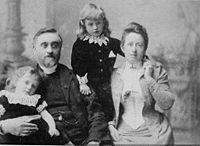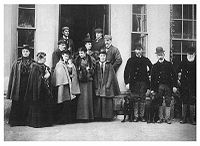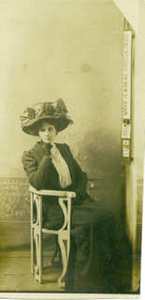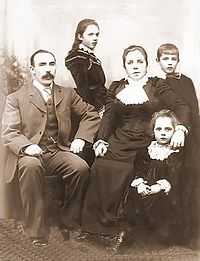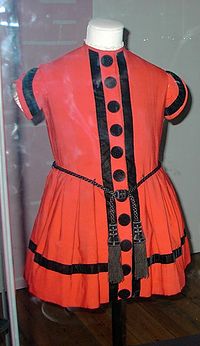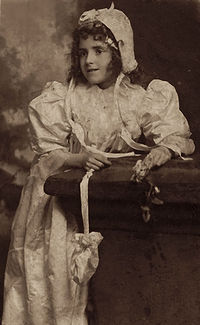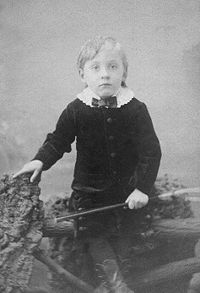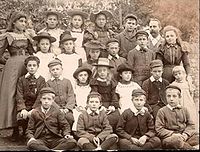Family Tree Forum Costume Gallery 1850 - 1899
From the Family Tree Forum Reference Library
Contents
General Everyday Clothing
| Early 1850s | |
| This lady was born in 1794. She wears a plaid patterned bonnet, and a lace collar over a loose fitting jacket that does not match the skirt. She wears black net gloves. |
| 1850s | |
| Pagoda sleeves as seen on this dress became fashionable in the 1850s, though her hairstyle is more old fashioned. The curls would have dropped put very easily in damp weather. She is the woman seen on the right of the picture of two sisters in the 1840s section. |
| 1850s | |
| This lady was born in 1794 and died in 1862. Her dress has pagoda sleeves and deep fringing below the braid; her dark bonnet and the dark braid suggest mourning or half mourning. Her black net gloves are of the fingerless sort. |
| 1853-6 | |
| Early 1860s | |
| Elizabeth was born in 1824. Note the hair covers her ears; in the late 1860's the ears were shown. She is also wearing "engageantes" - false white detacheable sleeves which were easily removed for laundering. These were introduced during the 1850's. |
| Early 1860s | |
| Early 1860s | |
| Sarah Richardson nee Awty (my gt gt grandmother) who died in 1879. She was the wife of a printer and publisher in Greenwich. If you look closely you will also notice that she has a large goitre on her neck. |
| Early 1860s | |
| Sarah Richardson's husband, Henry S Richardson - a publisher and printer in Greenwich |
| 1860s | |
| 1860s | |
| 1863-65 | |
| Strong colours were now available, aniline dyes were created during this period, red had been the first in 1859, followed by black and blue in 1863. |
| Early 1870s | |
| Elizabeth was born in 1814, and was a well off grocer's wife. This photo was taken in Margate in the 1870's, presumably on holiday as she lived in New Cross, South London. The dress is silk, with detachable lace collar. The chain appears to be for a watch as it goes into a tiny pocket. |
| 1870s | |
| William wore exactly the same coat in the photo below in 1882. Here, as a younger and more confident looking leather factor holidaying in Margate he wears it undone to show off his stylish waistcoat and cravat held with a large tiepin. |
| 1874 | |
| Sarah aged 25 was both daughter and wife of Lancashire weavers; she is holding her second child. Her dress is ornamented with a knobbly V shaped braid at the neck, the three ruffles at the bottom of the dress are only slightly gathered, a sign of less wealth as more expensive clothes had more ornamental decoration. The child on her lap is a boy. |
| c1875 | |
| A silk mercer's daughter on holiday in Margate. |
| 1875 | |
| c1878 | |
| A Vicar and his wife with a child relative; all from a fairly well to do family. |
| c1880 | |
| c1880 | |
| c1880 | |
| c1880 | |
| Jane was a leather factor's wife, though before her marriage she had been a braider employing 6 hands and later a children's dressmaker so she would have been capable of making the lace, tassels and multi layered trimmings that adorn her dress. She appears to be holding a piece of knitting or crochet work. The top edge of her corset is clearly visible under the fabric at her bustline. |
| 1880s | |
| 1881 | |
| c1880s | |
| 1881-2 | ||
| Maria's dress is heavily ornamented with "passmenterie" a form of decoration also used in furnishing at the time characterised by tassels, ruffles, braids and large ornamental buttons. The dress is drawn in to a bustle at the back. Her bodice is worn with a deep lace collar and she has a chatelaine pinned to her ample bosom with 4 chains tucked into a side pocket. | The photographers were in partnership from 1881, Maria died in 1882 which gives a relatively short period for this photograph to have been taken. A lady of her age may not have been up to date with the latest fashions, she seems have had the dress as "best" for a while. The family appear to have holidayed in Margate as her home at this time was in the village of Ightham, Kent. |
| 1882 | |
| The baby was born 11 March 1882, which helps date the picture to the summer or autumn of that year. William on the far right had owned this coat for a while, and chose to wear it buttoned, compare with the picture in the previous decade where he looks more casual. In 1882 he has chosen a tie like the modern ones we all know rather than a cravat and tiepin. |
| 1885 | |
| The corset is a maternity corset, it has additional lacing at the sides to allow for the wearer's changing shape. A cotton chemise is worn underneath. The draws have an open crotch as was normal at the time. Petticoats would be worn over the bustle. |
| 1888 | |
| While her nephew wears the very popular sailor suit, aunt has a tightly fitted bodice with a lace jabot at the neck held by a brooch. |
| c1890 | |
| My great great grandmother, Pattie Sophia Davenport |
| c1890 | |
| Harriet, from Kenilworth, Warwickshire. She married in 1902 aged 25. Possible taken for her 21st Birthday. |
| Early 1890s | |
| Elizabeth b 1843 married her cousin John Paternoster, a gamekeeper so they were a working class family.The photo would have been taken in early 1890's. Plain suits with little ornamentation except perhaps a brooch on the collar and the hair tied back in a bun with no fringe was the order of the day. |
| Early 1890s | |
| Florence died in 1896. She has a small lace collar, the bodice is beaded with a pattern of diamonds, the front fastenings are concealed. |
| 1890s | |
| No idea when this photo was taken of my Grandfather's sister. She was born c.1871 East Lulworth.
She married in London in 1902, had 3 children but sadly died at the age of 36, 1907, London. |
| c1893 | |
| Revd. Arthur Simmonds Mammatt and his family. The boys were born in 1888 and 1890. |
| c1895 | |
| Emma, b 1876, married Jacob Stechmann a tailor in West Ham in 1898 but I believe this photo to have been taken in 1895-6. Collars were high and with a ruffle or lace under the stiff outer. Emma's father was a sailor and then a railway porter so again they were a working class family. |
| c1895 | |
| Ezekiel Paternoster b 1810 (far rhs with bushy white beard) was my 2nd Great Grandfather. He was an agricultural labourer on an estate in Rushmere St Andrew, Suffolk. The hip length capes of the ladies are very masculine and functional as befitted their country style of living. However, this was the era of La Belle Epoque and in high society the capes were embellished with embroidery, lace and beading etc and were much more frivolous in appearance. The double layered cape worn by the 3rd lady from the left was introduced in 1894. The little round hats that they are wearing date from late 1880's. |
| Late 1890s | |
| Born 1871, married in 1896, possibly taken on honeymoon. |
| c1897 | |
| 1898 | |
| c1899 | |
| late 1890s | |
| My great grandmother's daughter in law in the late 1890's. She died aged 59 in 1900. Note the aspidista in the background. |
| Late 1890s | |
| The dress, in silk, has "leg of mutton" sleeves ruched at the top and decorated with blue velvet. The bodice is hand stitched and mounted on a boned calico lining, fastening with 12 hooks into hand sewn eyelets hidden by the front pleating. Some gores of the original skirt remain and this was lined with stiff cotton net and trimmed with the same velvet. Another bodice once existed (one sleeve pictured below which also shows the original colour), although all that remains are the sleeves and left front, as the dress was given by an elderly lady to a young woman to be unpicked for reuse during the 1940s. |
Sportswear
| Late 1870s | |
| Owning and riding a pennyfarthing required plenty of money, energy and daring. The brake when it existed was not very efficient and when freewheeling downhill the feet were taken off the pedals which continued to turn at the same rate as the wheel, riders often put their legs over the handlebars. Consequently the men are wearing knee breeches for their flexibility and being tighter fitting there is no excess fabric to catch in the mechanisms, worn with shoes rather than boots which would restrict ankle movement. The jackets have plenty of pockets for all those odds and ends useful for touring cyclists, both wear neckerchiefs held by a metal ring, there is no shirt collar visible, there may have been a light jersey worn underneath. Their hats have a club badge.
The photo, taken at Catherine St, Salisbury is close to the anciently named Pennyfarthing Street which may have been the reason for their visit. The cyclist on the right lived in Sevenoaks, Kent and family legend has it that he was the first man to ride a pennyfarthing from London to Wales. He also has some sort of bag slung on his back from a cord across his chest. |
Wedding Attire
Funeral and Mourning Attire
Childrens Clothing
| 1850 | |
| This comes with a pair of detachable full length sleeves (not shown). |
| 1855 | |
| Blue silk with velvet braid. |
| 1874 | |
| Boys were dressed in dresses until well past toddlerhood, tartan being a popular choice for them. He also wears an enormous buckled belt. |
| c1888 | |
| Bridget was born 1882 in Dublin City. I guess she would have been aged about 5 on this photo? |
| c1888 | |
| He wears a velvet suit with knee breeches with three buttons down the side of each leg, lace collar with silk bow tie and carries a whip in his hand. The rustic look with the logs was popular at the time. |
| 1896 | |



